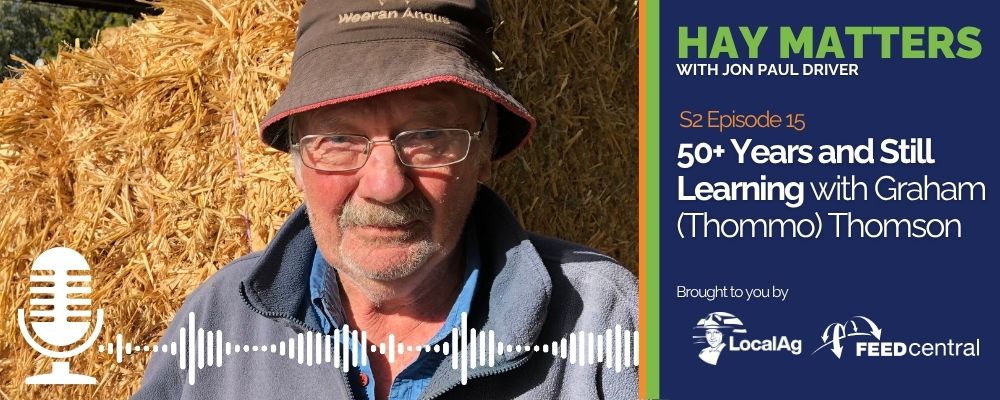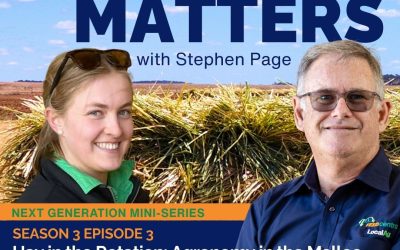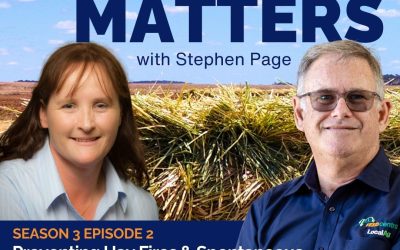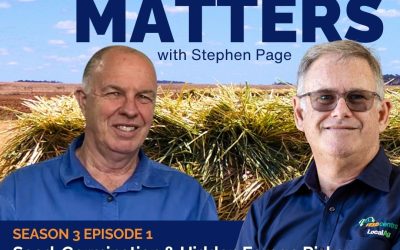
Podcast Highlights
In this episode of Hay Matters, brought to you by LocalAg and Feed Central, Grower Services Manager Steve Page hits the road to uncover a unique regional story of buried haylage, long-term storage, and unexpected opportunity.
When grain grower Pat Hull purchased a property near Warren in 2022, he wasn’t expecting to find over 1,000 tonnes of buried forage sorghum haylage stored in pits by the previous owner, following the drought-breaking rains of 2020. With no livestock of his own and limited on-farm use, Pat turned to LocalAg to connect with buyers further south, and the response was immediate.
- The haylage was originally cut, baled and buried in 2020 by contractor Ben Wright from Central West Contracting, after strong summer growth
- Bales were stacked four high in excavated pits, wrapped in plastic and sealed with soil for long-term storage and pest protection
- Feed tests returned excellent results for aged haylage: 12.4% CP, 9.25 MJ/kg ME, 51.4% NDF, 35.7% ADF, and 41.7% DM
- Pat listed the product on LocalAg using original baling photos, generating national interest before opening any pits
- With feed shortages in Victoria, the first truckload has already moved to southern dairies, with more to follow
- Hay contractor Ben Wright shares practical insights on why buried haylage works, key moisture thresholds, and how proper handling influences long-term results
Read Transcript
Tim Ford 0:02
Hi, I’m Tim Ford. Welcome to the Hay Matters podcast, where the Feed Central and LocalAg team unpack the very best of what’s happening in Australia’s fodder industry. From planting through to baling, testing and feeding, we cover the characters and the information that matters most to everyone in the supply chain.
Jon Paul Driver 0:20
Hi. It’s Jon Paul driver here with you for the Hay Matters podcast. We’ve got some exciting changes happening behind the scenes. I’ll be handing over hosting reins to a couple of familiar voices, Steve and Alex from the Feed Central team. You’ll still hear me from time to time. We’ve got a few new things in the pipeline I’m looking forward to sharing with you soon. For now, let’s cross to Steve, who was recording live at the AFIA conference last week.
Stephen Page 0:54
Hello. It’s Steve Page here from Feed Central and LocalAg, and I’m here at the AFIA conference on the Gold Coast for 2025. 12 months ago, we had Thommo who joined us and did a podcast with JP, and I’ve welcomed him back again this year, and just wanted to have a chat and catch up with him on how the season’s gone and a bit of his recollections also on what’s happened over that 12 months. Good afternoon Thommo.
Thommo 1:18
Good afternoon. Steve, yeah. Well, 12 months seems to fly, especially when you’re getting older. It seems to go quicker. But since last year’s conference, we’ve probably had the driest spring, summer, autumn. In fact, I know we have, my rainfall was the lowest on record on the farm I’ve been on for 52 years, and I keep rainfall records daily. So that was probably the worst thing. I was lucky enough that I lease some country that has got river frontage, so I was able to grow a reasonable amount of hay to get myself out of trouble instead of having to buy it. So that worked out quite well. Otherwise it was just a pretty tough farming year. Probably the best thing was that the price of stock stopped up, so that did help. And I think most farmers in our area were the same. They got a pretty good price for their lambs or the calves that they sold, so that worked out well, yeah, that’s probably about all people have been really doing sort of get up each day and think, What do I feed now? Which is a … You could drive a tractor or Ute or anything with a bar or a roll of hay on, and the sheep had come from the other end of the paddock, even if you didn’t have anything on, you just drove a tractor past down the road. They all come chasing across because there was no feed in the paddocks, and that was everybody was in the same boat.
Stephen Page 3:08
Yeah. And here we are this afternoon on the Gold Coast, looking out over the ocean, watching the rain come in. So yeah, a bit of a situation, we’ve got here to come away and have this happen up here. But also, yeah, so yeah, you’ve been great. You’ve been actually getting out and helping a few neighbours and that through these difficult times, also.
Thommo 3:29
Yeah, talking about the rain up here, Queensland’s been getting a lot of rain, and there was an old bloke who he’s passed now, but he farmed all his life down home, and he said it’ll never… This is last year when it was dry. He said it’ll never rain down south while it’s raining all the way up the east coast of New South Wales, and Queensland. And he stuck by that till he died at 96 so he reckoned that hadhave been going on forever.
Stephen Page 4:01
And Tommy, you drove up this time to the Gold Coast, a couple thousand kilometres from your place, and you were saying, What? What did you see along the way?
Thommo 4:08
Well, I probably passed, I don’t know how many big square bale hay sheds, and I know after years in the industry, where a heck of a lot of them are, I didn’t see one with any hay in it. I saw a few rolls of hay out in paddocks around properties that people, I’d say, were just keeping for their own use. Two or three truckloads of damaged hay and some, I think was straw all heading south, but they’d be coming out of, I would think either very northern New South Wales or Queensland, heading south, and they’re going right down, well to the south coast of Victoria. From up here, I had a neighbour just up the road, and he got rolls of hay for …he runs a horse farm. He got these little rolls of hay. I call them little, four foot by four foot… B double load. He wouldn’t tell me how much they cost, but they came from up here in Queensland, and they’ve he back loaded the truck, could came to Brisbane and pulled them all the way down home.
Stephen Page 5:20
Yeah. So we’ve started the conference, the AFIA conference. We were only just in the first day of it that we had an AGM first up this morning, and we had 11 candidates for the board, which is a great result after a lot of years where we’ve had difficulty filling the board, just like your thoughts on how the AFIA conference is going and what your thoughts are for the future, for AFIA.
Thommo 5:43
Yeah, so I think very good. I haven’t missed a conference. And, yeah, we’ve been through a few hard times last year or two, but I think it’s turning the corner. The thing… I like coming to the conferences, we’ve all got to keep learning and keep changing. Otherwise we’d be still cutting hay with, well, carting with the horse and cart. So even in the time I’ve been in the job, I’ve seen the changes in the last 40-50 years from small squares, econ fodder rolls, which were rolls that weren’t wrapped, no string round. You couldn’t really move them to rolls of high to big squares. It’s all just changing, and it’ll probably keep changing. There’ll be more innovation, and that’s what you’ve got to watch.
Stephen Page 6:40
We’ve seen a lot of changes, even in the short time I’ve been involved with the industry. But what hasn’t changed? Do you think in the industry, what stayed the same? Not machinery, of course, or not the size of the bales, but what has stayed the same?
Thommo 6:54
If you find somebody that really wants to work in the industry, and there’s a few young ones coming on now, and there were even back in my day, they’re the old blokes that are here now, and that never changes. I don’t think if somebody gets involved in the industry young and enjoys it, they’ll stick with it, mostly. And I think that happens in most industries, but it does in this one anyway, because I’ve talked to different older people that I know that have been in a few for years, and they say, ‘Oh yeah, it’s good. The young ones are coming up, and that’s what we need.’ And I’m glad to see these young ones stepping up and taking a bit more of, you know, a bit of interest in the board and committees and that sort of thing. I think that’s what we need. I mean, you can’t leave it to the old people all the time.
Stephen Page 7:53
No, you can’t. It’s nice to actually being in the conference there. And I’ve always said, like when I travel around and that it’s lovely seeing the young people that are in the fodder industry, and there’s a good representation in that room there today. And we’ve actually got another young fellow who’s stepped up on the board, which is great to see also.
Speaker 1 8:14
With Feed Central’s LocalAg, you can connect with farmers and suppliers across Australia, increasing your market and ensuring you get the best deals wherever you are, list your machinery, livestock, feed and more for free, and take advantage of LocalAg, safe and secure payment system, CheckVault to ensure all of your transactions are protected. Feed Central’s LocalAg is providing Australian farmers with trusted connections and transparent trading.
Stephen Page 8:42
So just wondering, yeah, what are your plans for yourself? Are you looking at retirement, or would that would that be the bad thing?
Thommo 8:51
Not at the moment. We’ve, we’ve talked about it. I’ve some of my leased country I will give up for the next 12 months. I’m very fortunate that I’ve got, I call them. They’re a wrist worker. It’s a school based apprenticeship. I’ve got a very, very good one now who’s about finished, but I think she’s going to stop around for 12 months, and I’d be prepared to actually even take another one on if you get a young kid that really wants to have a go, and I’ve had three or four of them, they can just reduce your workload a lot, like this time I’ve gone away for eight, nine days, just left the young girl to have enough. Do all the feeding, check of used lambs, do the lot. And if you get young ones like that, yes, they’ll make the odd mistake. But if they’re prepared to learn by the mistake, everybody in life’s made of one mistake, if you learn by it, you’re laughing. So that’s and at this stage. Fresh long as I’m reasonably healthy and I’ll probably keep going for a few more years.
Stephen Page 10:07
It’s not work when you enjoy it, is it?
Thommo 10:07
it? No, and I do. I still. It’s like somebody said to me, why’d I drive up here? I said, that’s a holiday. I drove trucks for years. I think nothing in driving seven or 800 kilometres a day, see what the country looks like. You can’t see it from 5000 feet in the air properly, but I can look in hay sheds. I can I stopped even looked at a couple of crops, drove into the paddock and checked the height of them and moisture in the ground. Well, you can’t do that when you fly, so I’m quite happy doing that. Oh, and I really enjoy still coming to a few conferences, learning something. I think you’ve got to when you get older, especially, you’ve got to keep learning, otherwise you get stuck or stuck in a rut, I suppose is a word you keep doing it the old fashioned way. There’s a chap I know at home, and he still sort of won’t change. He’s still using the old 3×3 bailer, because that’s, you know, that’s what dad used. Well, that doesn’t work. He’s costing more to cart it in. It costs more to stack. It costs more to feed it out. But no, you won’t change because Dad did it that way. Well, we’ve just got to in this day and age. You’ve got to keep moving forward.
Stephen Page 11:32
And also, then you pass on the knowledge that you’ve gained over a lot of years to these young ones that you’ve got coming through. But also you’re teaching them the changes that are happening within the industry too, and they can potentially be teaching you too.
Thommo 11:45
Yes, they are like years ago, mobile phones came in. I bought one in 1983 or 1984. I’ve seen the technology that’s moved there. It was off what they call an old bag phone, and I’ve still got it, but nowadays, yes, I haven’t got 100% tech savvy, but I can grab the phone, check maps, work out where I’ve got to drive without carrying the road atlas, all that type of thing you want to get onto somebody who’s not answering your phone send you a text message. Time to get back to you if you need all that type of things, yeah, just you’ve got to keep thinking ahead. And I learn off these young ones too. They’ll sort of show me something and say, Oh, well, we’ll put this app on your phone so you can check something out, and it works. I mightn’t use the app all the time, but at least y’know. I’ve got it.
Stephen Page 12:48
How did you go with the app in the AFIA conference there for your voting to this morning?
Thommo 12:52
Well, I couldn’t because I forgot to bring my 240 volt charger, and the phone was dead flat, but I have gone down town and bought a charge in there, so I’ve got a charge don’t forget. All right.
Stephen Page 13:04
Well, thank you, Tommy, that was lovely to catch up with you again. Hope you enjoy the rest of the conference, and we look forward to seeing you again.
Thommo 13:10
Hope to be back at the conference again next year.
Stephen Page 13:14
We look forward to seeing you.
Jon Paul Driver 13:16
Thank you to Steve for that interview with Thommo and thank you for listening to the Hay Matters podcast. If you’re interested in sponsoring the podcast or getting your brand in front of our national audience of 20,000 plus farmers, growers and agribusinesses, get in touch with the team at Feed Central to find out how. So that’s all from me on the Hay Matters podcast. It’s been a pleasure hosting the series, and I look forward to talking to you again soon with a new project that’s on the way.



